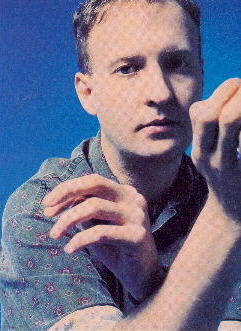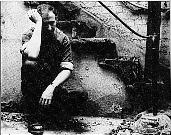HERE COMES THE RAINY SEASON
Glad to be free of Hüsker Dü, this solitary man BOB MOULD
talks about the success of his solo career and how he regrets an acclaimed
group coming to such an undignified end.
| STORY BY GRAHAM LINEHAN PHOTOS BY MARY
SCANLON It's funny, but in colour,
in person, Bob Mould looks much the same as he does in the black and white shot that
graced the sleeve of 'Workbook'.
His expression hasn't changed; he still looks simultaneously expectant
and relaxed, calm with reservations. And he's still holding a cigarette. When he speaks he
taps it into the ashtray, gusts of smoke escaping his mouth with each word. After an hour,
the ashtray resembles a small funeral wreath ravaged by fire.
"The last thing I want is for people to listen to the records and
come away with, Oh, we really feel sorry for Bob," he says. "The goal is for
people to examine whether they identify with the various ways of dealing with various
situations."
Do you use the songs to prepare yourself for further pain? |
 |
"Yeah, I think so," tap, tap, exhale. "It's part of the
healing process, getting those kinds of thoughts out of your mind and allowing yourself to
look forward to something again, even if it's a variation on what you've gone through
before. You try to document the places you've been and trace what kind of an effect that
has on you next time round, whether it's in a relationship or a friendship or
whatever."
Do you enter things with your guard up?
"Um, you can't," he laughs. "You have to let go and let
yourself be completely immersed in it ... knowing full well that the worst can happen. You
have to keep going on. You could never have an amazing relationship without completely
giving in. But it's hard. You get torn between, God, I've been through this before ...
and, God, I don't care."
Tap, tap, exhale.
Bob Mould's second solo album, 'Black
Sheets Of Rain', is not an entirely worthy successor to last year's monolithic 'Workbook',
but it does feature some of his most wildly electric primal screams since the ugly demise
of Hüsker Dü. Its main fault, probably, is that it stretches the mordancy and bleakness
of 'Workbook' far past breaking point. Everything's still in black and white. Autumn
walking unchecked into winter.
"It's a different album," he says. "it's similar but
it's not the same. Thematically, it's along the same lines. It's still the rust. But the
sonic approach is different. I just chose electric guitars as the main vehicle this time,
as opposed to acoustic. And the cello wasn't in my head this time ... I was hearing
electric guitars in my head."
It's certainly louder. Was that due to moving base from Minnesota to
Manhattan?
"It had a lot to do with the shading of the record. On the farm in
Minnesota everything was very green and very quiet. There was a lot of solitude and
natural sound, and when you get thrown into the city you're immediately bombarded with
constant noise and aggression and speed, and that has to show up in your work.
"You try to compete and coexist with your elements.
‘Workbook' was a very outdoor, open-sounding record. This one is the sound of the
city in its own way ... not like Lou Reed's album ('New York'), which was very
sight-specific, but more to do with the sense of concrete and steel."
You seem to put yourself in places where you don't feel that
comfortable.
"Well, once you get too relaxed in a place - as I was in Minnesota
- you get a lot less inspired. The less difficulty there is, the less there is to contend
with. New York is really exciting, though. Miserable but exciting. There's a lot to take
in there. And there's a lot of conflict; racial conflict, class conflict.
 |
"It's interesting, watching the decline of a major
metropolitan city, being there to witness that..."
How do you deal with the fabled everyday obnoxiousness of New York's
inhabitants?
"I'm polite," he says, smiling. "You can freak people
out just by being polite." |
It's the curse of a solo artist. Leave
your band, record an album and suddenly everybody's calling you 'mature'. Novelists
‘mature', playwrights 'mature'...surely it's rock 'n' roll's job to regress...
'Mature' is a word you see a lot in Bob Mould reviews. He is now 30.
"Let's be honest, we're all getting older," he says in his
soft, gas-flame voice. "I think that year alone I had before 'Workbook' gave me a
look at what my priorities were. Of course, I still wanted to make music but what kind,
y'know? Did I still want it to be a thrash thing or what?
"It gave me a chance to get more of a grip on the terms that I
use, the sonic temperament that you have from record to record. So, it's maturing, yeah,
but just because something's mature doesn't mean it has to be boring."
Recently, Bob pared down his band to three members: himself, Anton Fier
(of The Golden Palominos) on drums and Pere Ubu bassist Tony Maimone. He doesn't feel much
need to baptise the unit (unless you count the current working title of The Bob Mould
Band).
"I never felt comfortable being part of a group," he
explains. "I'm not necessarily talking about that in the band sense of the word. I'm
cynical about people who base their complete lives around groups, who feel that their
lives aren't complete unless they're part of something. I get scared of group
mentality."
He sighs. "America especially is so orientated that way. It's not
individualistic. People really want to belong ... to a fashion statement, a political
group or a religious thing. 1 find it very frustrating. 1 like being alone. 1 don't like
being part of a gang."
Were the seeds of the feeling sown when Hüsker Dü were still
together?
"Yeah, and in the old days it was supposed to be a democracy where
everybody had an equal say in everything, and as time went on it became apparent that it
wasn't. It was getting very frustrating for me to keep trying to maintain that illusion.
"Now, it's pretty cut and dried. With Anton and Tony it's very
flexible and good. With the Hüsker Dü situation it was always, if somebody left, that
was it, nobody could be replaced. So there was always that hanging in the back of your
head. Now, everyone knows that if by the end of all the touring we look at each other and
realise it's not that much fun any more, we can all walk away and not feel lost.
"In a sense, there's more equity. We're playing this music and
that's all there is to it."
Hüsker Dü collapsed under a weight
of backbiting and infighting. Grant Hart, the band's drummer and second songwriter, even
included a song on his LP, 'Intolerance', which appeared to be addressed to Bob. It was
entitled 'You're The Victim'.
"Yeah, ah ha ha ha ha. I heard the album once, aha
ha aha ha... I thought it was funny. It was the album he wanted to make, that's all I can
say about it except ... I'm glad Hüsker Dü broke up."
Are you happy about the band's legacy?
"Seems like the guitar band thing is really back," he says,
squeezing his thousandth cigarette butt to death. "Whether it's the Dinosaur Jr type
or some of these English bands. The whole experience of Hüsker Dü was great... |
 |
"It's unfortunate that it soured as it did, and because that
souring aspect of it was harped upon by other people in the band so much, it just made me
want to reject it. When you've got people you used to work with either badmouthing you or
the experience, you end up feeling that way. But now, with the distance, I can appreciate
it more. I thought it was a great thing, it's just a pity we didn't try to solve our personal
differences until it was too late."
Did the friction in the band help the music?
"No. It got very ritualistic. By the last album it had just gotten
stagnant. It was the same as the three albums before it. It didn't progress much, and
that's a good lime to stop. I think if Hüsker Dü had made another album it would have
been terrible.
" Hüsker Dü might be important still to a lot of people in the
sense of music history, and I'm flattered by that, but it doesn't affect my life any more.
As regards the fighting, I said all I had to say in the nine years the band was
together."
Did the split leave a large gap in your life?
"When I left the band in January of '88, making music in public
was the last thing on my mind. I really wanted to get out of the whole thing. I'd gotten
sick of the business, gotten sick of the routine of constantly touring, gotten sick of
never having a private life, never having time for myself. So I just withdrew from the
whole thing and spent a year just writing music for myself with no real intention of
making a record, or some kind of statement, or anything.
"Then it sort of snowballed and friends started asking when I was
going to start making music again. I sent out a demo and the response was amazing. Every
label in the country seemed ready to do a deal. So I settled on Virgin and did the album.
"But I made the record for me. I knew people had certain
expectations so I wasn't too optimistic about the response, but I didn't care. So when the
response was so good, it came as a shock.
"'Workbook' will always be a special album to me because ... I
don't want to make allusions to anything silly but ... there was the stuff before
'Workbook' and the stuff after. 'Workbook' was like a fulcrum. And things are gonna change
again soon. They have to."
Life is being good to Bob Mould at the moment. He has his music, his
cigarettes, a city to look at. And things are going to change soon. As the man said, they
have to.
Tap, tap, exhale.
Reproduced from Select, November 1990
[Bob
Mould Index] *** [Husker Du Index] *** [Sugar Index]


